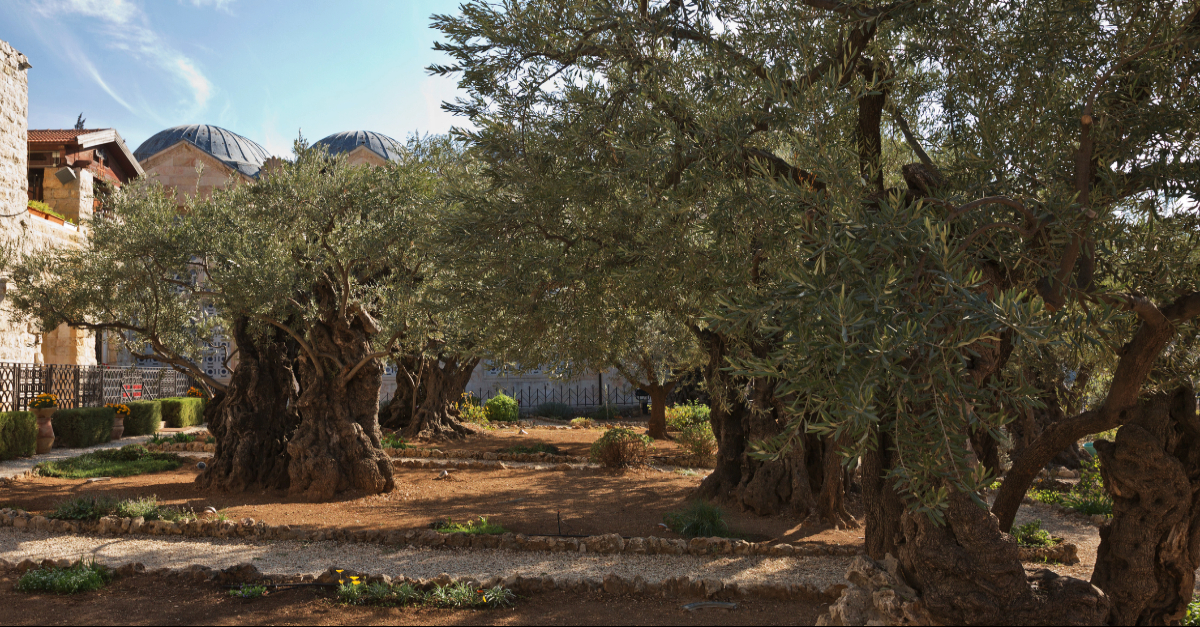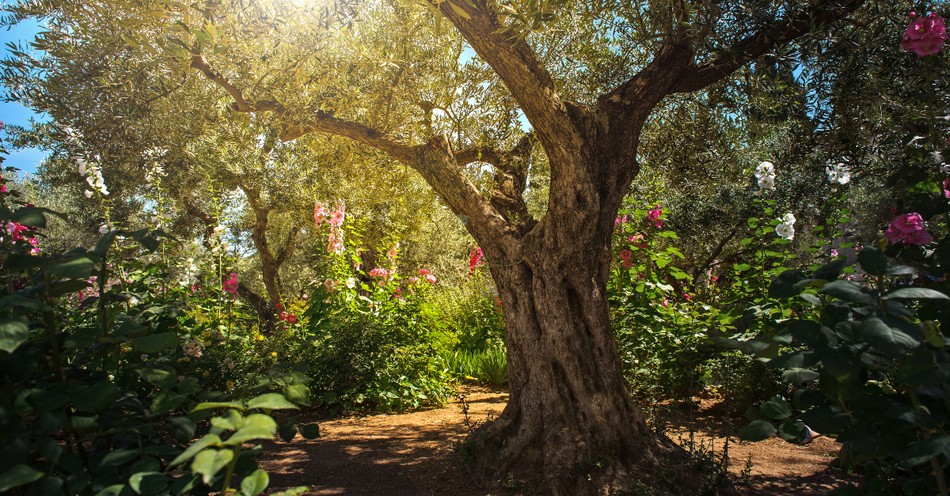The sorrow Jesus experienced in the Garden of Gethsemane on Maundy Thursday, the last night before His crucifixion seemed to be the culmination of all of the sorrow He had ever known. This time at Gethsemane, next to the cross itself, was the most difficult moment of His life. Learn the meaning, significance, and location of Gethsemane as well as the prayer Jesus prayed there as he anticipated the cross.
What Does 'Gethsemane' Mean?
Gethsemane, meaning "oil press", is an orchard of olive trees at the foot of the Mount of Olives. The Garden of Gethsemane is referenced in the Old and New Testament, having historical and theological significance at the time of Jesus Christ and today.
Location of the Garden of Gethsemane
Jessica Brodie gives an explanation of the location and scripture sources of Gethsemane, saying:
While the exact location is difficult to pinpoint, the Bible indicates the Garden of Gethsemane is on the Mount of Olives, a historic place of great meaning throughout the Bible. The Mount of Olives was a “Sabbath day’s walk from the city,” we are told in Acts 1:12. Easton’s 1897 Bible Dictionary tells us the Mount of Olives was named as such because it was clothed in olive trees. Sitting about 200 feet above sea level, it was one of a few mountain ridges east of Jerusalem and afforded a good view of the city. The valley of Kidron lies between the mountain and Jerusalem, and the whole region was a place Jesus often visited in his travels throughout the Gospels.
The Mount of Olives is a place of significance; King Solomon erected a “high place” there for the worship of foreign gods, causing the Lord to become very angry with him (1 Kings 7-11). King David and his followers fled Jerusalem through the Kidron Valley and up the Mount of Olives, weeping and barefoot, after his son Absalom rebelled with an uprising (2 Samuel 15:13-30). The Old Testament prophet Zechariah prophesied that “a day of the Lord” would be coming when the Lord would stand upon the Mount of Olives, ready for battle, and be king over the whole earth (Zechariah 14:1-9).
Garden of Gethsemane Today
The exact site of Gethsemane is still in question. Dr. Thomson (The Land and the Book) says: "When I first came to Jerusalem, and for many years afterward, this plot of ground was open to all whenever they chose to come and meditate beneath its very old olive trees. The Latins, however, have within the last few years succeeded in gaining sole possession and have built a high wall around it...The Greeks have invented another site a little to the north of it...My own impression is that both are wrong. The position is too near the city, and so close to what must have always been the great thoroughfare eastward, that our Lord would scarcely have selected it for retirement on that dangerous and dismal night...I am inclined to place the garden in the secluded vale several hundred yards to the northeast of the present Gethsemane." (Excerpt from Easton's Bible Dictionary)
Some have accepted the garden at the foot of the Mount of Olives in East Jerusalem today as the Garden of Gethsemane referenced in the Gospels. That garden is still preserved, and many of the ancient olive trees that grow there are believed to be descendants of those present during Jesus' time. The site includes the Church of All Nations, also known as the Church of the Agony, which was built over a portion of the garden in the early 20th century. Visitors to the Garden of Gethsemane can explore the peaceful surroundings, meditate, and reflect on the events that occurred there on the night of Jesus's betrayal.
Jesus Prays in Gethsemane
The Gospel of Matthew
Then Jesus went with them to a place called Gethsemane, and he said to his disciples, "Sit here, while I go over there and pray." And taking with him Peter and the two sons of Zebedee, he began to be sorrowful and troubled. Then he said to them, "My soul is very sorrowful, even to death; remain here, and watch with me." And going a little farther he fell on his face and prayed, saying, "My Father, if it be possible, let this cup pass from me; nevertheless, not as I will, but as you will."
And he came to the disciples and found them sleeping. And he said to Peter, "So, could you not watch with me one hour? Watch and pray that you may not enter into temptation. The spirit indeed is willing, but the flesh is weak."
Again, for the second time, he went away and prayed, "My Father, if this cannot pass unless I drink it, your will be done." And again he came and found them sleeping, for their eyes were heavy. So, leaving them again, he went away and prayed for the third time, saying the same words again. Then he came to the disciples and said to them, "Sleep and take your rest later on. See, the hour is at hand, and the Son of Man is betrayed into the hands of sinners. Rise, let us be going; see, my betrayer is at hand." (Matthew 26:36-46)

The Gospel of Mark
And they went to a place called Gethsemane. And he said to his disciples, "Sit here while I pray." And he took with him Peter and James and John, and began to be greatly distressed and troubled.
And he said to them, "My soul is very sorrowful, even to death. Remain here and watch." And going a little farther, he fell on the ground and prayed that, if it were possible, the hour might pass from him. And he said, "Abba, Father, all things are possible for you. Remove this cup from me. Yet not what I will, but what you will." And he came and found them sleeping, and he said to Peter, "Simon, are you asleep? Could you not watch one hour? Watch and pray that you may not enter into temptation. The spirit indeed is willing, but the flesh is weak."
And again he went away and prayed, saying the same words. And again he came and found them sleeping, for their eyes were very heavy, and they did not know what to answer him. And he came the third time and said to them, "Are you still sleeping and taking your rest? It is enough; the hour has come. The Son of Man is betrayed into the hands of sinners. Rise, let us be going; see, my betrayer is at hand." (Mark 14:32-42)
Discover What We Can Learn From Jesus' Prayer in the Garden of Gethsemane.
Spiritual Significance of Gethsemane
Gethsemane, meaning "oil-press", is the name of an olive-yard at the foot of the Mount of Olives, to which Jesus was to retire (Luke 22:39) with his disciples, and which is especially memorable as being the scene of his agony (Mark 14:32; John 18:1; Luke 22:44).
Jesus' prayer in Gethsemane, where he famously said, "Not my will, but yours be done" (Luke 22:42), is a profound example of submission to God's will, even in the face of suffering. This moment underscores the central belief in Jesus' obedience to God's plan for the salvation of humanity. Gethsemane is seen as a symbol of the spiritual struggle that believers may face in their own lives. Jesus' earnest prayer and inner turmoil demonstrate the importance of prayer and the reality of facing difficult circumstances with faith and trust in God.
Did Jesus Know What Would Happen When He Went to Gethsemane?
Greg Laurie teaches how the cross was Christ's goal and destination from the very beginning, and how that knowledge informs his behavior in Gethsemane.
(The following is an edited transcript of the video above, edited for readability. Laurie accidentally mispeaks when he quotes Jesus as saying "Nevertheless, not your will, but mine, be done." Jesus' words were, "let not my will, but yours, be done.")
Let's think for a few moments about what happened on the day that Jesus died. Our Lord takes Peter, James and John into the garden of Gethsemane. He's under tremendous pressure. I don't know if we fully grasp what Christ was going through in the garden. Dr. Luke tells us that he sweat, as it were, great drops of blood, and some medical experts have weighed in on that and suggested that may have been a first-century description of what we know today as hematohidrosis. Hematohidrosis takes place, and I've talked with some doctors about this, when there is a unique mixture of blood and sweat, when you're under the greatest pressure imaginable. So Jesus is sweating, as Luke says, drops like blood, and he says this to Peter, James, and John, "My soul is exceedingly sorrowful even to death. Stay here and watch." That phrase, exceedingly sorrowful, could be translated, "He was in terrified amazement." In other words, in the face of the dreadful prospect of bearing God's fury against sin, Jesus was in the very grip of terror.
The inner circle watches Jesus as he gets down on his knees, and he falls on his face, and he prays repeatedly this prayer. "Father, if it is possible, let this cup pass from me. Nevertheless, not your will, but mine, be done." And he didn't say it quietly. He cried this prayer out because we're told over in Hebrews 5:7 seven, during the days of Jesus 'life on earth, he offered up prayers and petitions with loud cries and tears to the one who could save him from death. He cried out to the Father. "Father, if it is possible, let this cup pass."
Why? Because Jesus was omniscient. Remember what that word means? All-knowing. He knew everything. He knew everything that was happening. I'm glad I'm not omniscient. I'm glad I don't know the future. There are things that I look back now in my past that it would've not have helped me if I would've known they were coming. I don't think I could have borne them. Jesus knew exactly what was coming. He knew that Judas Iscariot was coming with the Temple Guard. He knew that he was going to appear before Annas and then Caiaphas and then Pilate, and then before Herod, and then back to Pilate. He knew they were going to rip the beard out of his face. He knew that they were going to punch him in the face. He knew that they were going to take the Roman cat of nine tails and tear his back open. He knew that they would nail him to a cross. But worse of all, and here's what he was recoiling from. He knew he was going to have to bear the sin of the entire world, and that's why he prayed. Father, if it's possible, let this cup pass from me. What cup? The cup of the wrath of God. The cup of God's judgment that should have come upon each of us. Isaiah called it the cup of his fury. "You drank the dregs of the cup of trembling and drained it down."
Have you ever eaten something that was so disgusting it turned your stomach? Oh, imagine looking into this cup and what it represented. Imagine contemplating the horrors of bearing all of that sin. Kent Hughes wrote, and I quote, "in the greatest display of obedience that will ever be known, Jesus took the full chalice of man's sin and God's wrath, looked shuddering deep into its depth, and in a steel act of His will drank it all." And you can be sure that the devil was there in full force as Judas approaches with a kiss of betrayal.
(Video published on Christianity.com on July 2, 2010)
Photo credit: GettyImages/salajean; GettyImages/jirivondrous
Christianity.com's editorial staff is a team of writers with a background in the Christian faith and writing experience. We work to create relevant, inspiring content for our audience and update timely articles as necessary.
Learn more about the meaning and significance behind the Easter holiday and Holy Week celebrations:
What is Lent? and When Does Lent Start?
What is Ash Wednesday? and When is Ash Wednesday?
What is Palm Sunday?
What is Maundy Thursday?
What is Good Friday? and When is Good Friday?
What is Holy Saturday?
What is Easter? and When is Easter Sunday?
Easter Bible Verses
The Resurrection of Jesus
Easter Prayers



.jpg)
